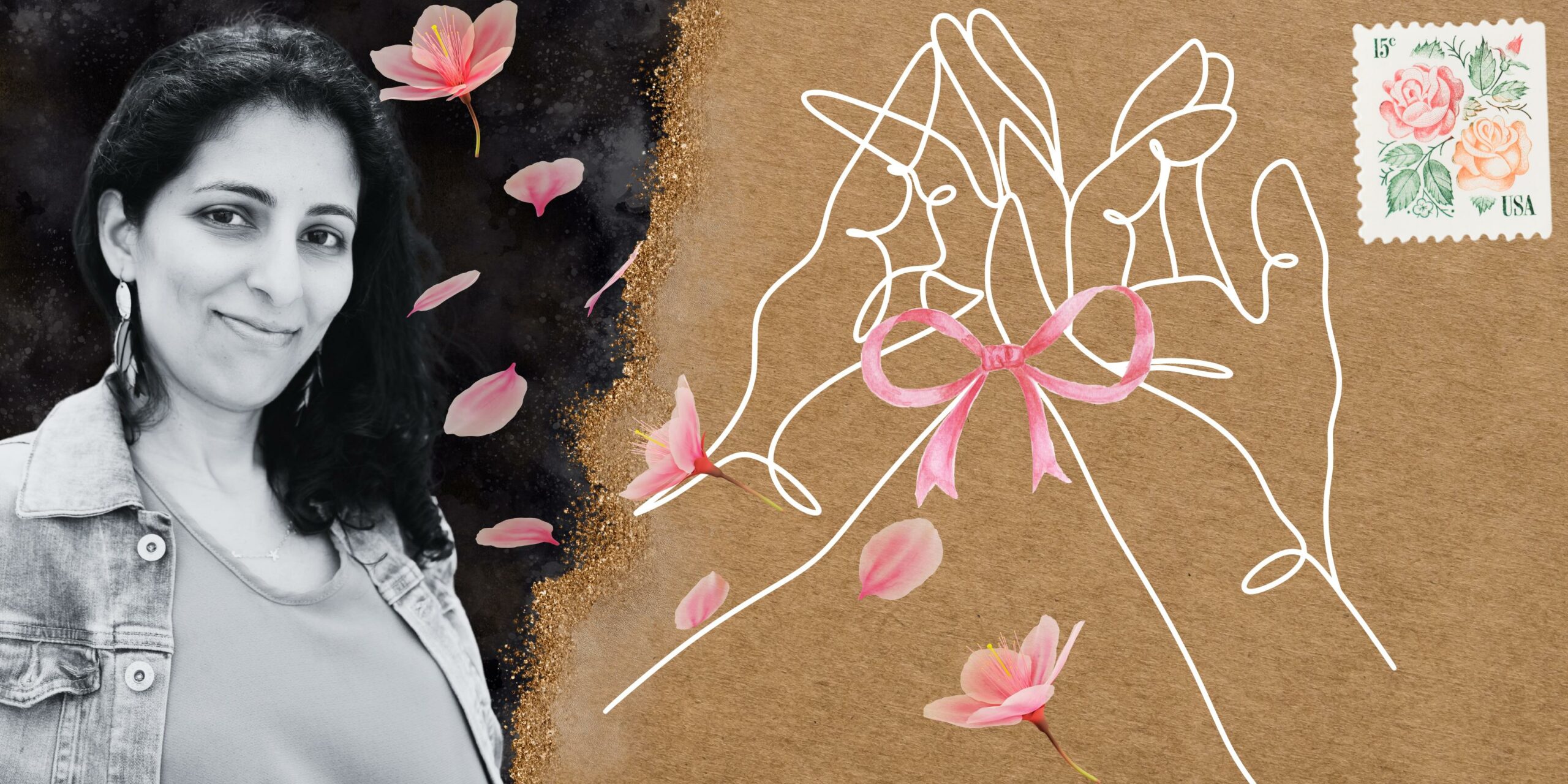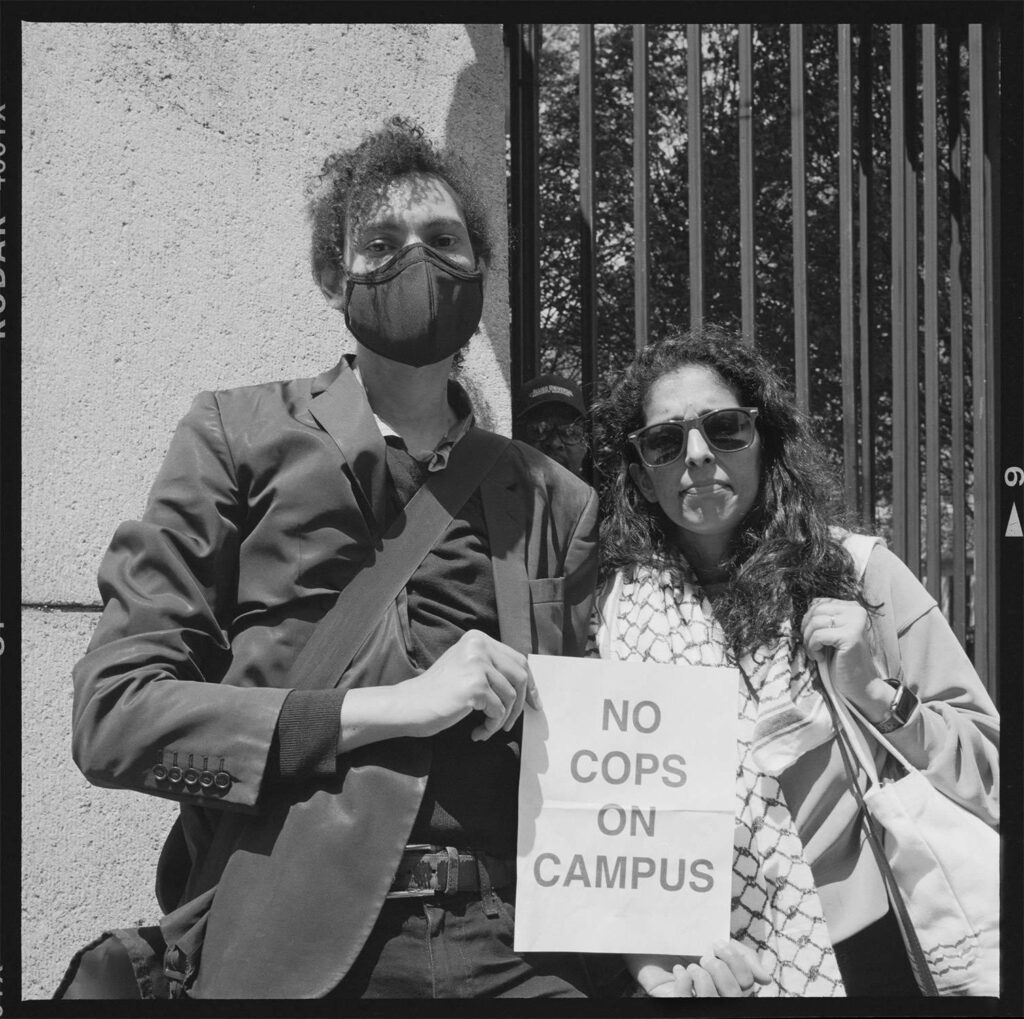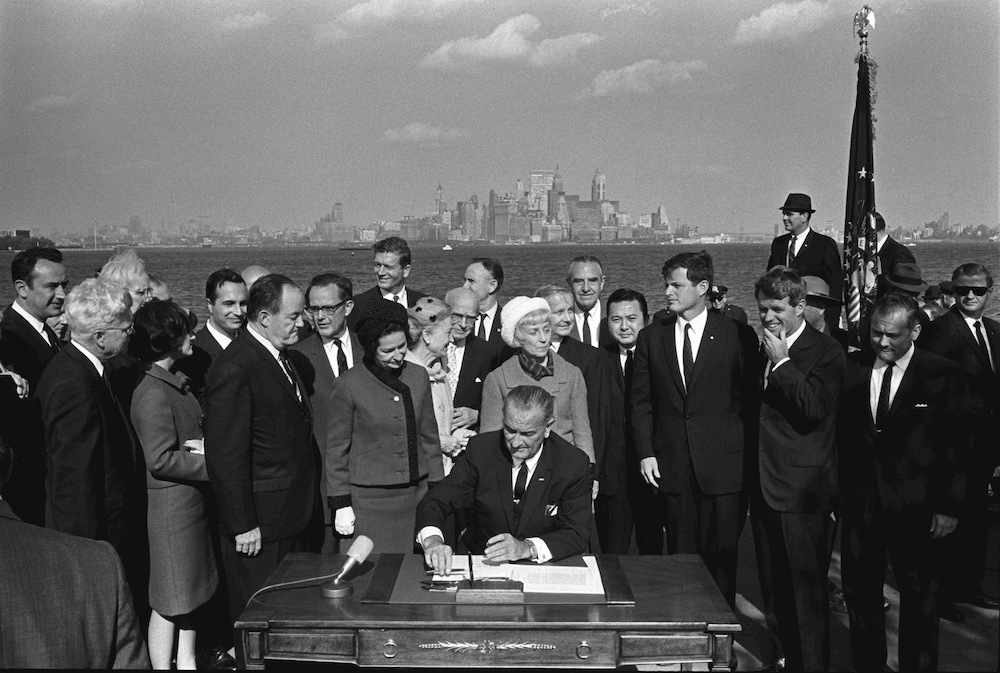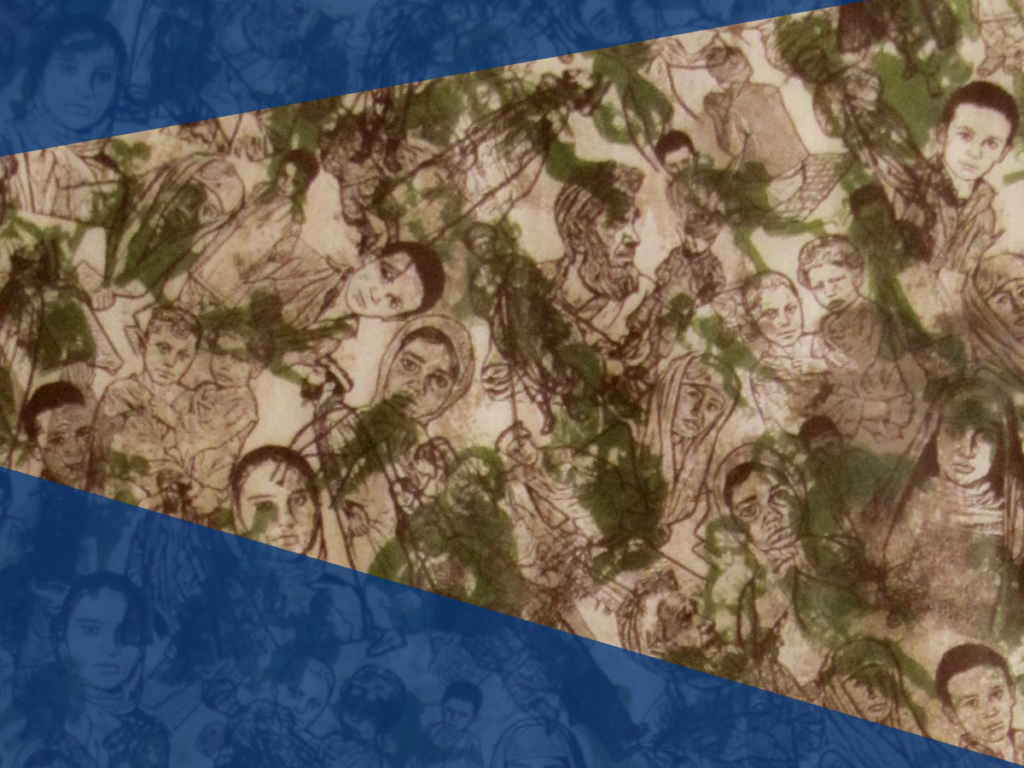An interview with essayist Nina Sharma

May 31, 2024
One could argue that Nina Sharma’s debut collection of essays, The Way You Make Me Feel: Interracial Love in Black and Brown, is actually a series of love letters. The most obvious among them, of course, is addressed to Sharma’s spouse and frequent collaborator—the poet Quincy Jones. While Sharma’s essays are indeed meditations on navigating interracial partnership and intimacy against a backdrop of familial expectation, model minority myths, and a looming Trump presidency, they are also tributes to the joys that have filled her life: laughter, friendship, music, The Walking Dead, teaching, and the confidence of a really good blowout, to name just a few. While the keywords that might accompany The Way You Make Me Feel may sound serious, its substance never lets one forget that for Sharma, falling in love across differences is at once messy, sweet, exhilarating, and most of all, fun.
Nina Sharma is a writer, improv performer, and professor of creative writing at Barnard College. She is also a former program director of the Asian American Writers’ Workshop. We spoke via Zoom in early May, touching on the influence of improv on her writing, writing about mental health, and finding the lightness and play within stories.
Salonee Bhaman (SB)
You and Quincy, your husband, are both writers. Sometimes you write things together, too. How does that work in your household? Are you always working?
Nina Sharma (NS)
I grew up in a family of a lot of doctors: my parents were both doctors, both of my sisters are doctors … so it’s been interesting for me to be in this, like, all-writer household! What I saw between my parents was a household where two people were fluent in one language, a shared language of medicine. So, it’s been incredible to feel that I have that same thing—but with writing. That is the language I always want percolating through my house. I probably also exploit it a little; I’m always talking about the things I’m working on or thinking about. Quincy is better in that he has a process—he works on a poem on his own, then he shows it to me. At this point we’re really familiar with how the other works and how creation happens. But I really think about writing and craft like a shared language—there’s a way that we talk to each other that, to me, is really fun. There’s always the goal of getting back to that place of fun, natural banter. To capture the way we actually speak, and the community of people who filter in around us—that is the journey of writing and revision.
SB
It almost sounds like your apartment is a kind of permanent home workshop!
NS
Yes! But in a way that feels like it challenges the trauma of the traditional workshop.
SB
Hearing you say that reminds me that you and Quincy are both teachers, too—so you’re approaching “writing” from a few different perspectives most days.
NS
It’s funny, as soon as you said that, I started thinking about my students. Quincy and I have a shared intimacy and safety, but I also really try to consciously create a human space for my students. I think the best kind of teaching involves us all being human with each other.
SB
Comedy is a big part of your life and writing, and one of the pleasures of this book is how integral a sense of play or lightness is not only to your prose, but also to your processing of life. Could you speak on your relationship to humor and comedy?
NS
I think comedy, or humor, is a reminder that life is chaos. Doing comedy—especially improv—can be relentlessly chaotic. I’m really drawn to using that to propel a scene. Unlike, for example, on social media, where there’s such an imperative to curate a life. Or even outside social media, there are all these expectations that one should have a routine, a journaling practice, things like that. And what the past few years have shown me is that really, life just shows up. Just like with throwing out the rulebook with teaching, comedy is a reminder that life is more like that chaos than anything else. So, to me, comedy is the way to accurately represent a life story.
I had already been writing essays for a while when I started doing improv, and when I went back to writing, something had changed for me in how I wanted to show up on the page. I wanted the kind of “quick hit” feeling you can get on stage—when there’s something between you and the audience, this thing that you’re delivering and communicating.
At the time, I was working on “Shithole Country Clubs,” which is also in the book, and I remember saying out loud—in our home writers’ workshop—that I can’t separate what’s happened to me as a creator on the improv stage from what I want to do as a writer. I decided to structure the piece like you might structure an improv scene—I wrote it in a series of vignettes. It created this quickness that felt like doing an improv scene when the beats are escalating the tension and the pacing is quick, but I am still pulling in a lot of hard, personal content and dense research. I gave myself the goal of doing both: creating this deeply researched personal narrative, but also creating the illusion of a quick hit. I hope that my writing life and my performing life can keep coming together like that.
I also write a lot about some things that feel really tough to write about—my bipolar disorder, for example. In our home workshop, we talk about how important it is to find the fun in that kind of story. What’s the fun thing that keeps me going in a story? Sometimes the fun is just that you survived the experience. But it’s emboldened me to look for that consciously, and seize it as something I’m going to write towards.
SB
Two things stuck out to me while reading this book. The first was your thoughtful treatment of South Asian racialization in a way that accounted for both the model minority myth as a deeply destructive, but sometimes seductive, construct—one that’s rooted in a yearning for both safety and dominance, as well as questions of race, caste, and colorism within the diaspora. The second was the candor and grace with which you discuss your own experiences managing your mental health, which is a topic that’s so often marginalized and silenced within South Asian communities. I’m curious about how your own feelings of being different may have shaped your capacity to question or deconstruct other biases around interracial marriage or anything else.
NS
Absolutely. From a young age I felt a little bit like an outsider, in terms of health status. I think that’s the first way I thought of myself as an outsider. There has been some great writing recently that critically interrogates who “health” and “wellness” are for, but definitely one of my first identities growing up was as a sad kid. I felt like a health aberration. And I think it led me to develop my own questions around what “normal” or “healthy” means. I found that it was impossible for me to be “normal,” so I just stopped trying.
I have found myself asking what it means to write into that part of the story alongside the love story. I love rom-coms, but I don’t know if I would ever write one—but I think I wrote the book as a love story because it took meeting Quincy for me to feel like I was ready to talk about bipolar disorder. There’s a scene in the title essay in which I describe getting into Quincy’s car and seeing a Brown University sticker on the back of the car. And I realized—I can feel it so viscerally—that I saw that sticker and immediately thought about how that was the school I went to and had to leave after a year because I had a nervous breakdown. As soon as I saw the sticker, I thought it canceled me out from even dating Quincy. That is how shut down I was about that experience; I couldn’t even admit it to myself. And honestly, I think with Quincy my desire to jump his bones won out over my shame.
SB
I love that. What was it like to then write about that moment?
NS
I took little steps towards breaking the silence with my writing, but I had a harder time writing about my mental health than anything else. I just want to say to anyone who is trying to break silence: be patient with yourself, and I see you.
It really took until the last semester of my MFA program for that meet-cute moment to finally slip out of me. Come to think of it, I was really into James Baldwin and was taking a Baldwin seminar taught by Hilton Als. I was coming home one night, and all of a sudden that scene came to me—and I just flipped open the computer and wrote. It was the most I had ever said about my mental health. And then I closed the computer and never returned to it. I felt like I couldn’t match that, even though I tried to. In our home writing workshop, I would show Quincy my work and be upset because I’d feel like something was wrong. And he plainly said that it was hard for him to read, because it felt like I was shaming myself. Every sentence felt like shame. And it was true; it felt almost physically painful to write that way. By the last semester of the program, I was handing in these “technically perfect stories,” in the words of one colleague, where something was lurking under the surface. And when that classmate gave me that feedback, I felt like, really caught out!
So much so that I went into office hours with my advisor at the time—the great Margo Jefferson—and stumbled all over my words … I don’t even think I said a full sentence! I just said something like, “mental illness, shame, cannot write.” And her response was so useful, because she asked if I remembered feeling any pleasure during that time period. I immediately remembered this bright fuschia dress that I had plucked from my closet in the middle of a manic episode. All of a sudden, I just wanted to write that scene. That was the fun of the story. I told Margo I had been thinking already, “Why can’t I write about my road trip years—the time period where I began to have my manic break—the way Hunter S. Thompson writes a drug narrative?” Margo swiftly decentered the white male-ness of my statement, saying, “Why can’t we approach writing about mental health like writing about any other altered state?” And that kind of blew my mind. I was like, “Oh! I can bring in sensory imagery. I can bring in texture. I can bring in taste.” I could write my full embodied story in a way that I couldn’t before. It helped me. It changed not only that story, but my whole writing life.
There’s some kind of magic in talking about these taboo subjects with one another that unlocks something to you and makes you realize that this private experience is worth articulating. A big part of my experience at the Asian American Writers’ Workshop was encountering that over and over again during these weekly readings where people were writing into their dark corners. It made me realize, “Oh, I’m not the only weirdo, and I can write about my own thing.”
SB
I noticed that you used the phrase “meet-cute,” and something lovely about your book is the way you tell us a story about your interracial marriage, or about Afro-Asian coupledom, through both real engagement with critical theory and these sweet scenes from your actual life. You were bringing the personal and political together on the same page, sometimes. Did you think about that as you wrote?
NS
It felt really important to notice and write down all those little details and happy moments alongside some of the harder confrontations about racial identity because it spoke to a more complicated story than those that Black and brown people are often afforded. It felt like an important thing to be playful with. I like to think that a big part of this book was challenging the constraints of an American rom-com, because we don’t fit into that mold. In your standard rom-com, Quincy or I would be the helpful best friend who has nothing going on or, like, Dave Chappelle randomly showing up in You’ve Got Mail!
It was important to show the ordinary moments of falling in love and coming together that I don’t think white America wants to read. White America wants to read a story about race as pain, but we’re more than pain. White America doesn’t necessarily want to see a race story as a love story.
As I revised this book, there were many moments where I was like, “Well, I’m still not there. I’m still not seeing this coming together as a story.” I really tried to ask myself where I was hiding behind personal anecdote, or conversely, where I was hiding behind research. The whole adventure of this was that every essay came about in a different way. Seeing how the personal and political met was how I finally felt like I had something that was honest about myself.
Maybe that’s because I didn’t intend to pursue creative writing. I was initially going to get a PhD and had started a master’s program in American studies, focusing on Asian American studies. And for every paper I had to do, I just kept throwing in these personal narratives. I had a lot of great teachers who were very supportive of the critical and creative going together. Asian American studies meant something profound to me; the act of discovering it felt like an act of self-care. I don’t read self-help books, but that felt like my version of it.
Our life together as a couple is like the personal and the political going together. We have encounters all the time that drive that home. Literally, like deciding to be present the day that the NYPD invaded campus—I was so nervous, for myself but really also for Quincy. I was nervous about Quincy’s body, and he was nervous about me, and these things are things that we talk about all the time in ordinary and extraordinary ways. And there is a lot of trial and error—I think a lot of people think about solidarity as something that’s finite, but it’s something that you’re constantly working at. You have to constantly evolve and grow and interrogate where you may have a gap in understanding. And I hope that that’s part of what this book lays out there.

Writing and revising this book was kind of a process of solidarity, during which I really had to ask myself those same questions: What am I not seeing? Where do I land in a particular matrix of power and privilege? Even approaching it on a sentence level while revising can make solidarity a real part of your writing practice.
This interview has been edited for clarity and length.



